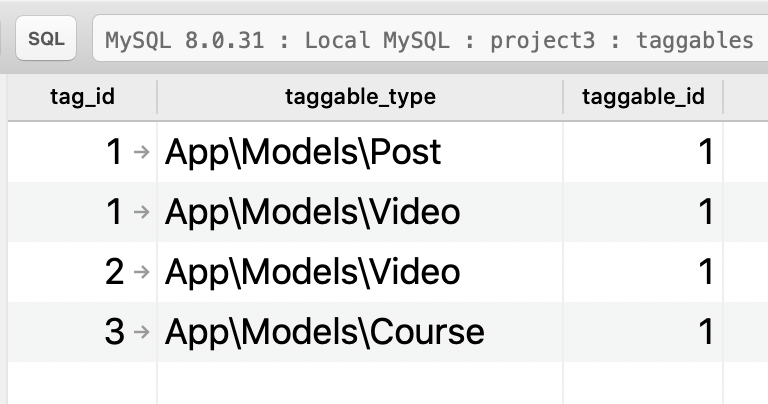In Laravel's many-to-many polymorphic relations, there is a situation where you can't get ALL records of different models by their "parent" record. Let me explain, and show the potential solution.
Scenario: you have multiple Models that each may have multiple tags.
Example Tags: "eloquent", "vue", "livewire"
And then each Post, Video, and Course may have many tags.
Our Task: get all records (Posts + Videos + Courses) by a specific tag.
Unfortunately, there's nothing like $tag->taggables()->get(). You will see the solution for this below, but let's go step-by-step.
Here's the DB schema for this:
tags id - integer name - string ... posts id - integer post_title - string ... videos id - integer video_title - string ... courses id - integer course_title - string ... taggables tag_id - `foreignId('tags')->constrained()` taggable_id - integer (ID of post or video or course) taggable_type - string (Model name, like "App\Models\Post")The DB table taggables deserves its migration to be shown, it looks like this:
Schema::create('taggables', function (Blueprint $table) { $table->foreignId('tag_id')->constrained(); $table->morphs('taggable');});Here's what the data in that DB table would look like:

Then, in the Eloquent Models, you have this code.
app/Models/Post.php
class Post extends Model{ public function tags() { return $this->morphToMany(Tag::class, 'taggable'); }}Similarly, the Models of Course and Video will have the same identical tags() method with morphToMany().
And then, if needed, the Tag model has multiple morphedByMany() relations.
app/Models/Tag.php
class Tag extends Model{ public function posts() { return $this->morphedByMany(Post::class, 'taggable'); } public function videos() { return $this->morphedByMany(Video::class, 'taggable'); } public function courses() { return $this->morphedByMany(Course::class, 'taggable'); }}Now, how to query data. How to get the entries by Tag?
Unfortunately, there's no way to run a single query, like $tag->taggables()->get();, because there's no single Model structure for different Post/Video/Course, they all have different fields, so how you can group them together?
Well, the trick is to run three different queries, but then combine the results into an identical structure and merge them together into one Collection. From there, you can paginate or transform that collection however you want.
$tag = Tag::find(1);$posts = $tag->posts()->get()->map(fn($post) => [ 'id' => $post->id, 'title' => $post->post_title]); $videos = $tag->videos()->get()->map(fn($video) => [ 'id' => $video->id, 'title' => $video->video_title]); $courses = $tag->courses()->get()->map(fn($course) => [ 'id' => $course->id, 'title' => $course->course_title]); $results = collect()->merge($courses)->merge($posts)->merge($videos);This code will return this structure, if there is a Post/Video for the tag but no Course:
Illuminate\Support\Collection {#2198 all: [ [ "id" => 1, "title" => "Post about Eloquent", ], [ "id" => 1, "title" => "Video comparing Vue and Livewire", ], ],}
I'm courious how to solve this issue with the modification: use only single query. It sounds more cheaper.
Since it covers three different DB tables with different structure, that one SQL query would probably be a UNION query, so not sure if it's cheaper.
If you create a Pivot model you can actually do this easily
On tag class
With your approach you get the same amount of queries